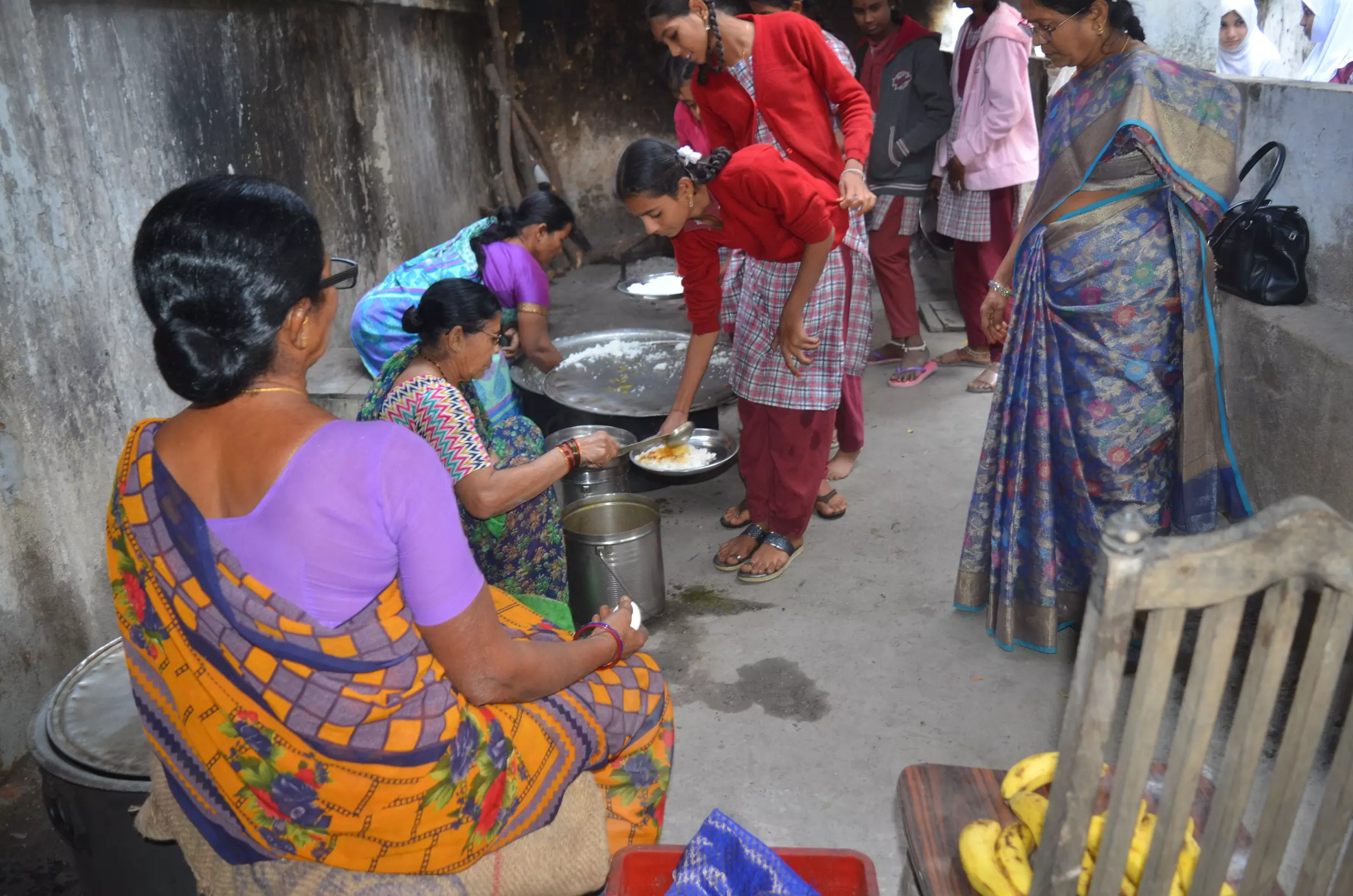Water Woes Impact Food Safety at Adilabad School

Rice used for cooking at government high school for girls in Bhukthapur in Adilabad town on Friday. The handwash area with taps was constructed newly but is not being used due to a shortage of water. Kavitha holds a plate with her name on it. Cooks serve food to the students. (Image by arrangement)
ADILABAD: In a bid to enhance the quality and safety of food served to students, the state government has mandated the formation of food safety committees in schools and hostels across the Adilabad district. This initiative aims to monitor and ensure hygienic food preparation and proper maintenance of kitchen facilities.
Investigations in several hostels and schools have revealed that food is often prepared in temporary sheds under unhygienic conditions. Many institutions lack permanent kitchens and fail to maintain proper sanitation standards, particularly in the erstwhile Adilabad district. Experts emphasise the urgent need to cement kitchen floors to prevent dust accumulation and to keep the walls and roofs of kitchens clean and orderly.
At Government High School for Girls in Bukthapur Colony, Adilabad town, staff reported significant challenges related to water supply. With a student population of 650, the school has struggled with inadequate water for cooking and sanitation. Currently, cooks rely on water from municipal tankers due to the irregular supply of Mission Bhagiratha water. This inconsistency has led to concerns over food safety and hygiene.
Food safety officers have identified that incidents of food poisoning are primarily caused by contaminated water and the use of poor-quality rice infested with worms. Although a monthly rice supply is provided for the Mid-day Meal programme, the rice is often stored in residential schools, allowing germs to proliferate in the old stock. To combat this, Gangamma, a cook at the Government High School, ensures that rice is thoroughly cleaned by washing it four times to eliminate any germs and worms. "We use quality edible oil and fresh ingredients to prepare nutritious meals.
Additionally, we offer bananas and eggs as per the menu to ensure students receive balanced nutrition," she explained.
Despite these efforts, Sara Khatoon, the headmaster of Government High School for Girls, highlighted the persistent water shortages that affect both cooking and hygiene.
"We have been facing water problems for a long time without resolution. We urgently need two additional borewells to meet our water requirements," she stated. Currently, the school relies on a single borewell that operates only five months a year, insufficient for the needs of the students, especially for maintaining clean toilets and personal hygiene.
The incomplete construction of the dining hall, initiated under the ‘Mana Basti..Mana Badi’ programme, has further complicated meal distribution. Khatoon urged authorities to finalise the dining hall to provide a centralised location for students to eat their meals. Additionally, a handwash area with taps was constructed but remains unused due to the ongoing water shortage.
On a positive note, students from SSC Srileka in Akoli village, Jainad Mandal, expressed satisfaction with the Mid-day Meals provided at their school. They welcomed the inclusion of Raagi Jawa as a snack, appreciating the efforts to improve meal quality.
The state government’s directive to establish food safety committees is expected to address these critical issues by enforcing stricter hygiene standards, ensuring reliable water supply, and maintaining kitchen facilities. Authorities are also being urged to expedite the completion of infrastructure projects like the dining hall to facilitate better meal management and distribution.
At Government High School for Girls in Bukthapur Colony, Adilabad town, staff reported significant challenges related to water supply. With a student population of 650, the school has struggled with inadequate water for cooking and sanitation. Currently, cooks rely on water from municipal tankers due to the irregular supply of Mission Bhagiratha water. This inconsistency has led to concerns over food safety and hygiene.
Food safety officers have identified that incidents of food poisoning are primarily caused by contaminated water and the use of poor-quality rice infested with worms. Although a monthly rice supply is provided for the Mid-day Meal programme, the rice is often stored in residential schools, allowing germs to proliferate in the old stock. To combat this, Gangamma, a cook at the Government High School, ensures that rice is thoroughly cleaned by washing it four times to eliminate any germs and worms. "We use quality edible oil and fresh ingredients to prepare nutritious meals.
Additionally, we offer bananas and eggs as per the menu to ensure students receive balanced nutrition," she explained.
Despite these efforts, Sara Khatoon, the headmaster of Government High School for Girls, highlighted the persistent water shortages that affect both cooking and hygiene.
"We have been facing water problems for a long time without resolution. We urgently need two additional borewells to meet our water requirements," she stated. Currently, the school relies on a single borewell that operates only five months a year, insufficient for the needs of the students, especially for maintaining clean toilets and personal hygiene.
The incomplete construction of the dining hall, initiated under the ‘Mana Basti..Mana Badi’ programme, has further complicated meal distribution. Khatoon urged authorities to finalise the dining hall to provide a centralised location for students to eat their meals. Additionally, a handwash area with taps was constructed but remains unused due to the ongoing water shortage.
On a positive note, students from SSC Srileka in Akoli village, Jainad Mandal, expressed satisfaction with the Mid-day Meals provided at their school. They welcomed the inclusion of Raagi Jawa as a snack, appreciating the efforts to improve meal quality.
The state government’s directive to establish food safety committees is expected to address these critical issues by enforcing stricter hygiene standards, ensuring reliable water supply, and maintaining kitchen facilities. Authorities are also being urged to expedite the completion of infrastructure projects like the dining hall to facilitate better meal management and distribution.
( Source : Deccan Chronicle )
Next Story

